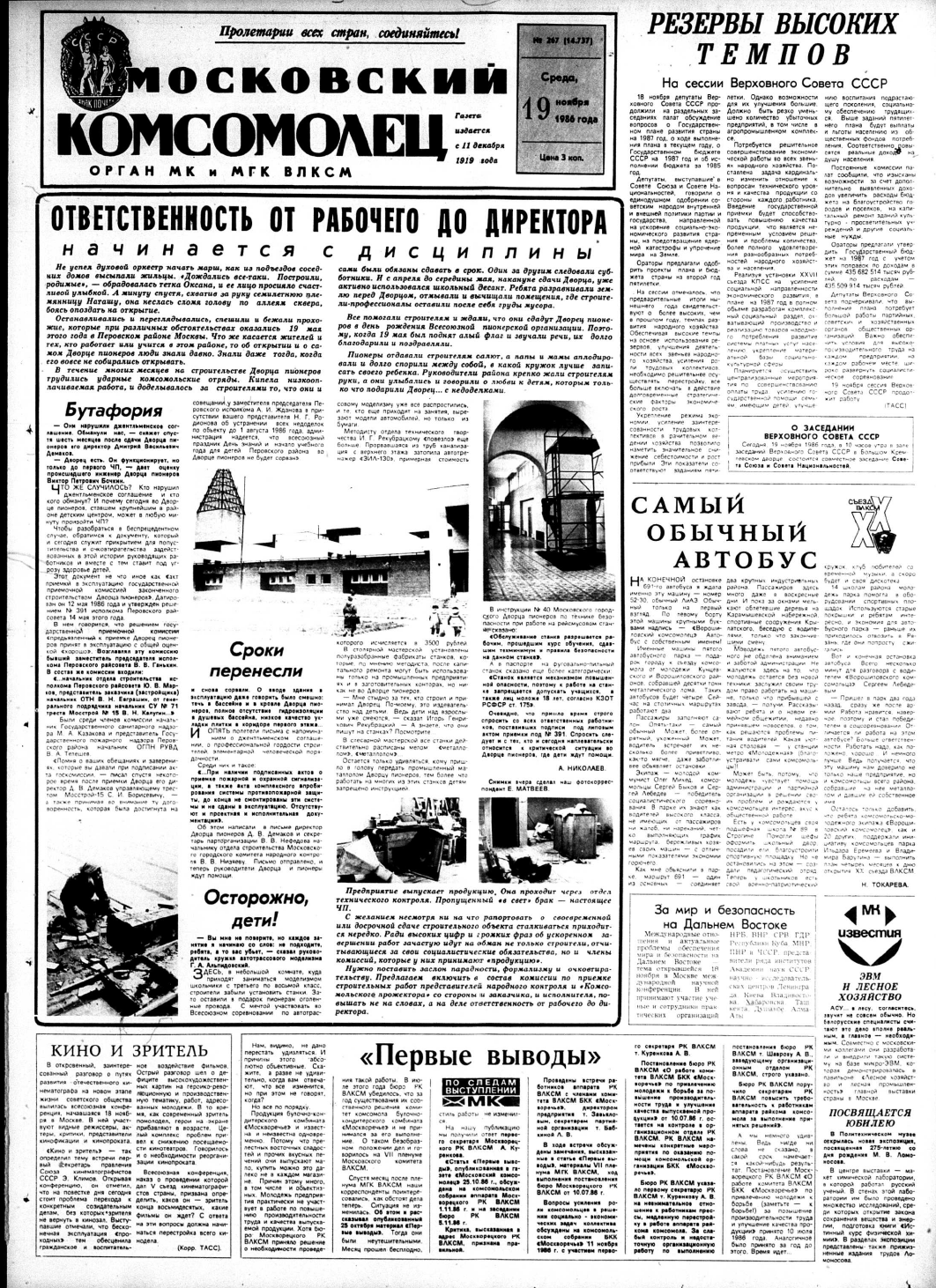Filed Under: Topic > Sensationalism > The First Article on Prostitution in the Soviet Union
The First Article on Prostitution in the Soviet Union

Although it was a widespread reality in the Russian capital and beyond, prostitution, like sex—which, according to the proverbial phrase, “did not exist in the Soviet Union”— was never acknowledged or discussed in Soviet media. The first article on the subject, “Belyi tanets” (The white dance), a reportage on the life of foreign-currency prostitutes working at Hotel Ukraina in Moscow, was published in Moskovskii komsomolets in 1986. It produced such a scandal that the prominent newspaper, a veritable Soviet institution, was shut down for one day to give Communist Party representatives time to heavily edit its second installment.
The article’s author, Evgeny Dodolev (1957-), was also a member of the teams behind the TV show Vzgliad and the magazine Sovershenno sekretno (Top secret). He was part of a new generation of hip, highly educated, well-traveled journalists who were shaking up the Russian media landscape by introducing Western, progressive, and generally “non-Soviet” approaches to journalism and entertainment—which involved, among other things, the adoption of a straightforward, matter-of-fact style devoid of empty ideological clichés. Dodolev’s article, in particular, was a typically perestroika-era combination of transparency, provocation, Western-style professionalism, and sensationalism.
Dodolev’s report mocked the absurd puritanism, hypocrisy, and detachment from reality of official Soviet culture. But the piece also comes off as intentionally titillating, as if it were using the excuse of revealing the darker sides of Soviet life to indulge in some salacious details—all while replicating the clichéd moralism it aims to chastise. Dodolev makes a series of sarcastic remarks about the greed and ruthless materialism of the young sex workers (and their mothers), who are described as not living up to the ideals of female strength, independence, and self-abnegation promoted by official Soviet culture. In so doing, he ends up blaming the victims of a fundamentally corrupt system instead of indicting its exploitative essence.
The article reveals the gray zones lying between top-down and grassroots initiatives, on the one hand, and progressive forces of change and repressive power structures, on the other. According to Dodolev, the KGB provided access and resources for his reporting. At the same time, the organization was instrumental in censoring the piece once it was published. Dodolev went on to found the popular weekly magazine Novyi vzgliad (New view), which combined new forms of political irony and tabloid-like sensationalism with “total pluralism,” per the magazine’s own slogan.
The article’s author, Evgeny Dodolev (1957-), was also a member of the teams behind the TV show Vzgliad and the magazine Sovershenno sekretno (Top secret). He was part of a new generation of hip, highly educated, well-traveled journalists who were shaking up the Russian media landscape by introducing Western, progressive, and generally “non-Soviet” approaches to journalism and entertainment—which involved, among other things, the adoption of a straightforward, matter-of-fact style devoid of empty ideological clichés. Dodolev’s article, in particular, was a typically perestroika-era combination of transparency, provocation, Western-style professionalism, and sensationalism.
Dodolev’s report mocked the absurd puritanism, hypocrisy, and detachment from reality of official Soviet culture. But the piece also comes off as intentionally titillating, as if it were using the excuse of revealing the darker sides of Soviet life to indulge in some salacious details—all while replicating the clichéd moralism it aims to chastise. Dodolev makes a series of sarcastic remarks about the greed and ruthless materialism of the young sex workers (and their mothers), who are described as not living up to the ideals of female strength, independence, and self-abnegation promoted by official Soviet culture. In so doing, he ends up blaming the victims of a fundamentally corrupt system instead of indicting its exploitative essence.
The article reveals the gray zones lying between top-down and grassroots initiatives, on the one hand, and progressive forces of change and repressive power structures, on the other. According to Dodolev, the KGB provided access and resources for his reporting. At the same time, the organization was instrumental in censoring the piece once it was published. Dodolev went on to found the popular weekly magazine Novyi vzgliad (New view), which combined new forms of political irony and tabloid-like sensationalism with “total pluralism,” per the magazine’s own slogan.